Guest Speakers 2018-2019
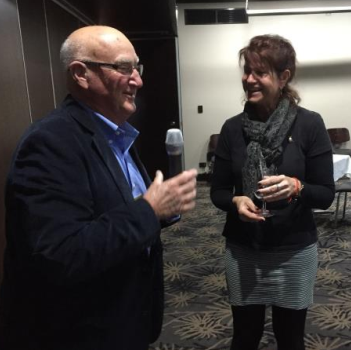
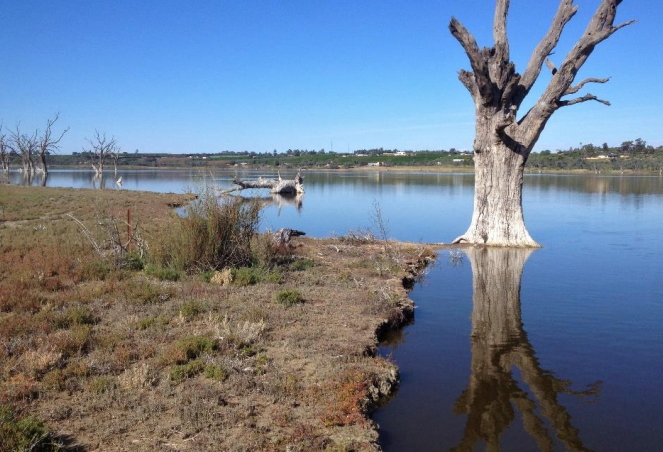

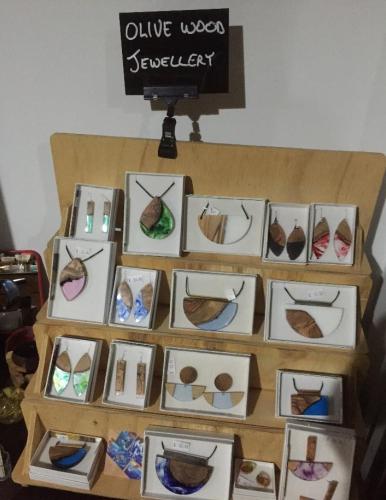 We visited the Olive Grove Farm owned and managed by Roger Hefford and Megan McKenzie on Benlow Rd. Roger addressed the meeting explaining how the property and sales section of the farm was set up. He grew up iApril n a family that was involved in horticulture in the Adelaide Hills and his father and grandfather grew vegetables and apples. He has owned the property in Waikerie since 1989 and originally used it to produce fruit and vegetables for his shop in the Barossa Valley. In 2015 he planted 22 000 trees (mainly olives) which increased the number to 28 000. The majority of the trees are a high-density variety which they harvest with a grape harvester. The olives are then sent away for processing and a sample of the oil is then sent off for chemical testing and hopefully is classified as virgin olive oil. To be classified as virgin olive oil the olives have to be processed within 24 hours of being harvested and contain the correct amount of essential chemicals.
We visited the Olive Grove Farm owned and managed by Roger Hefford and Megan McKenzie on Benlow Rd. Roger addressed the meeting explaining how the property and sales section of the farm was set up. He grew up iApril n a family that was involved in horticulture in the Adelaide Hills and his father and grandfather grew vegetables and apples. He has owned the property in Waikerie since 1989 and originally used it to produce fruit and vegetables for his shop in the Barossa Valley. In 2015 he planted 22 000 trees (mainly olives) which increased the number to 28 000. The majority of the trees are a high-density variety which they harvest with a grape harvester. The olives are then sent away for processing and a sample of the oil is then sent off for chemical testing and hopefully is classified as virgin olive oil. To be classified as virgin olive oil the olives have to be processed within 24 hours of being harvested and contain the correct amount of essential chemicals.In the shop they sell the oil and other items such as dukkha, balsamic vinegars, soaps made from the oil, cheeses and tapenade. They also have displays, gift baskets and sell products produced by other people such as dried fruits, nuts, jewellery and cheese knives (made by Will Kroehn.) They sell their products at local markets and display at the Royal Adelaide Show where they have won several awards.
We were able to taste a lot of their produce which was terrific.
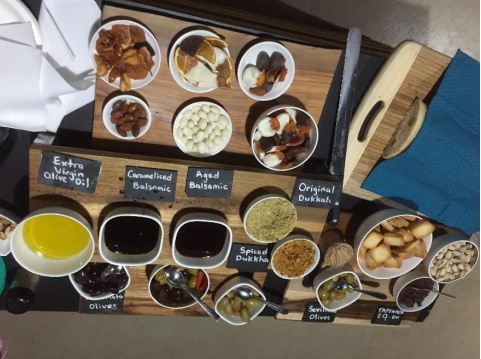
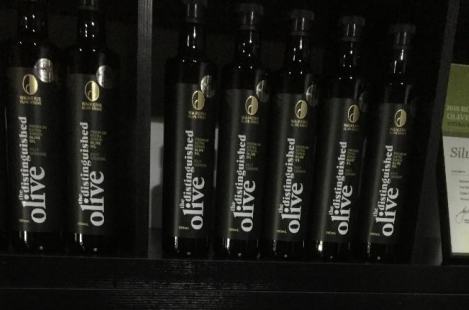
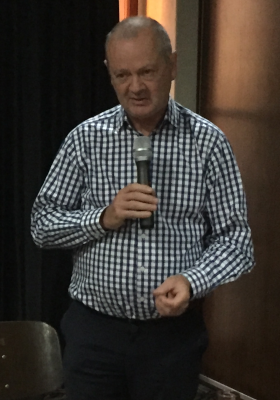
He is at present working on a mission plan and preparing a four year budget for the council. There has been an amazing amount of money coming into the area with the declaration of drought. A considerable amount has been allocated to the “Cliff Top” walk, car park for the silo art and a linkage to the water park. They are trying to get funds from the Murray Darling Basin economic fund because Waikerie does not appear to be eligible.
He also talked about the Waikerie Delivers meeting at which the River Front Master Plan was discussed. He mentioned some of the suggestions including moving the oval a bit to provide more room. He stressed that he wishes to work together with groups including the Rotary club to start the budget process.
He then discussed the Peake Tce project for which $2million has been allocated including putting power underground and redesigning the roundabout. Car Park access for IGA and development of individual Tourist information outlets were also mentioned.
A very informative talk and the club expressed interest in working closely with council on its projects.
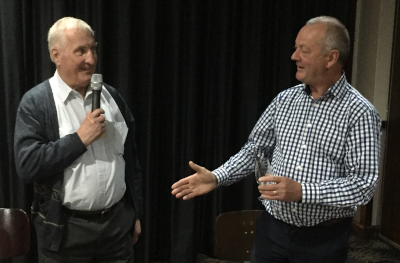
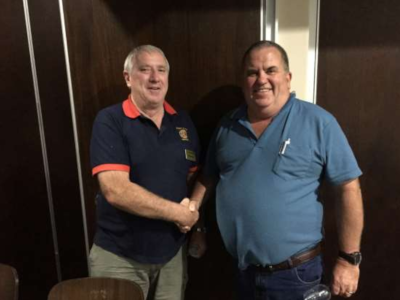
In the light of a couple of accidents in recent years there has been a tightening of regulations for pilots and planes which has led to less pilots that can provide the service. The organisation is currently working through this issue in order to have more pilots and their planes accredited.
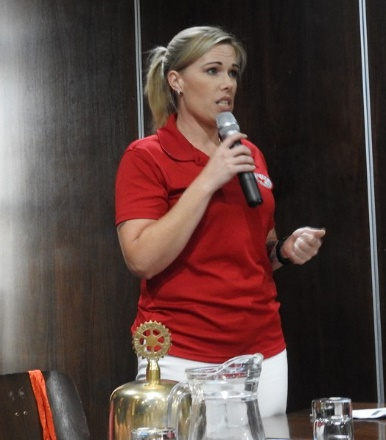 Kelley gave an interesting talk about the role of Red Cross in the Riverland.
Kelley gave an interesting talk about the role of Red Cross in the Riverland.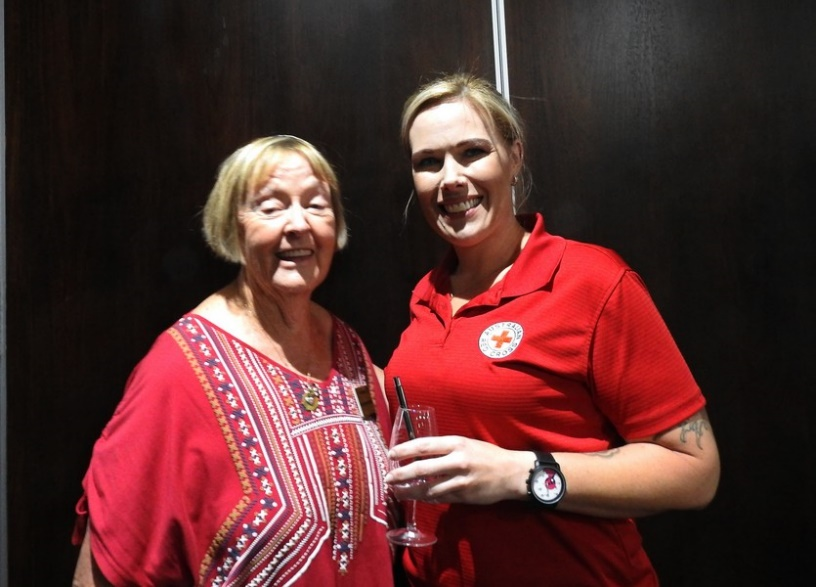
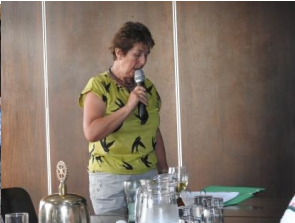 Robyn gave us an insight into her background. She worked in BankSA and rose through the ranks, eventually taking up a Branch Manager position in Adelaide for a period of time. For a couple of years there were only two female branch managers in the entire state, of which she was one. Robyn left the bank to help in the family business, Cain Electrical, before going back to the bank.
Robyn gave us an insight into her background. She worked in BankSA and rose through the ranks, eventually taking up a Branch Manager position in Adelaide for a period of time. For a couple of years there were only two female branch managers in the entire state, of which she was one. Robyn left the bank to help in the family business, Cain Electrical, before going back to the bank.She now has her own business, advising businesses on many aspects of their running (eg BAS).
The scheme was revived in October last year when we knew the drought was here to stay. Tim Whetstone, our local Member of State Parliament, was instrumental in revamping the program. The aim of the program is to listen to the farmers and their problems, find out their most pressing issues and point them in the right direction to obtain help.
- Ph: 0411 633 085
- Email: robyncain16@gmail.com
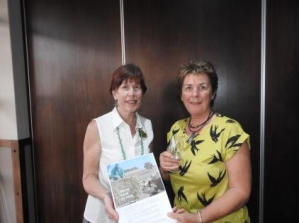
3rd October 2018
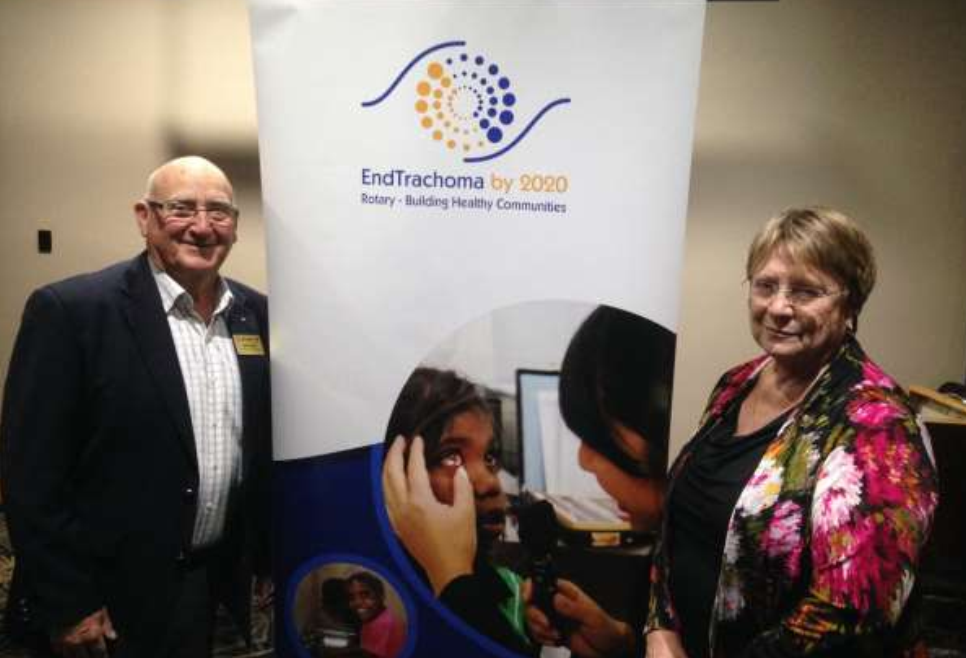
28th September 2018
Brenton gave a fantastic talk about farming in the mallee – one of the harshest environments for cropping in Australia.
The property was first cleared in 1920 by his grandfather and his poll merino stud was developed in 1975. He runs 2600 sheep on his 4500 hectare property and crops 3000 hectares. He talked about his life changing experience with a GSE trip to France and his development as a person gaining confidence through the years. He spent his early years studying at Roseworthy College and then his time as a shearer before taking over the property. He has developed into a pretty good shearer and has done several demonstrations for schools and at field days.
His community involvement has been impressive, providing several services to local schools and the kindy, providing work experience opportunities and placing a float in the local pageant. In recent years his ram sales have added value to the business and with wool and grain prices so high he believes he can ride out the current dry period due to this diversification.
He then spoke about the amazing advances in technology for farmers including no-till farming, improved spray technology, the benefits of autosteer technology, advances in agronomy services, the size of equipment and the benefits of mobile phone technology to access information.
He then described the problems they have had this year with wind, little rain, cold, a late start to the season and several other issues. He worked through his decision to grain feed his sheep through the summer due to the state of his paddocks and the crops grown this year. This then led to him touching on mental health issues for farmers and how he has changed priorities placing his family at the top of the list.
An excellent presentation which gave us a great insight into farming in the mallee.
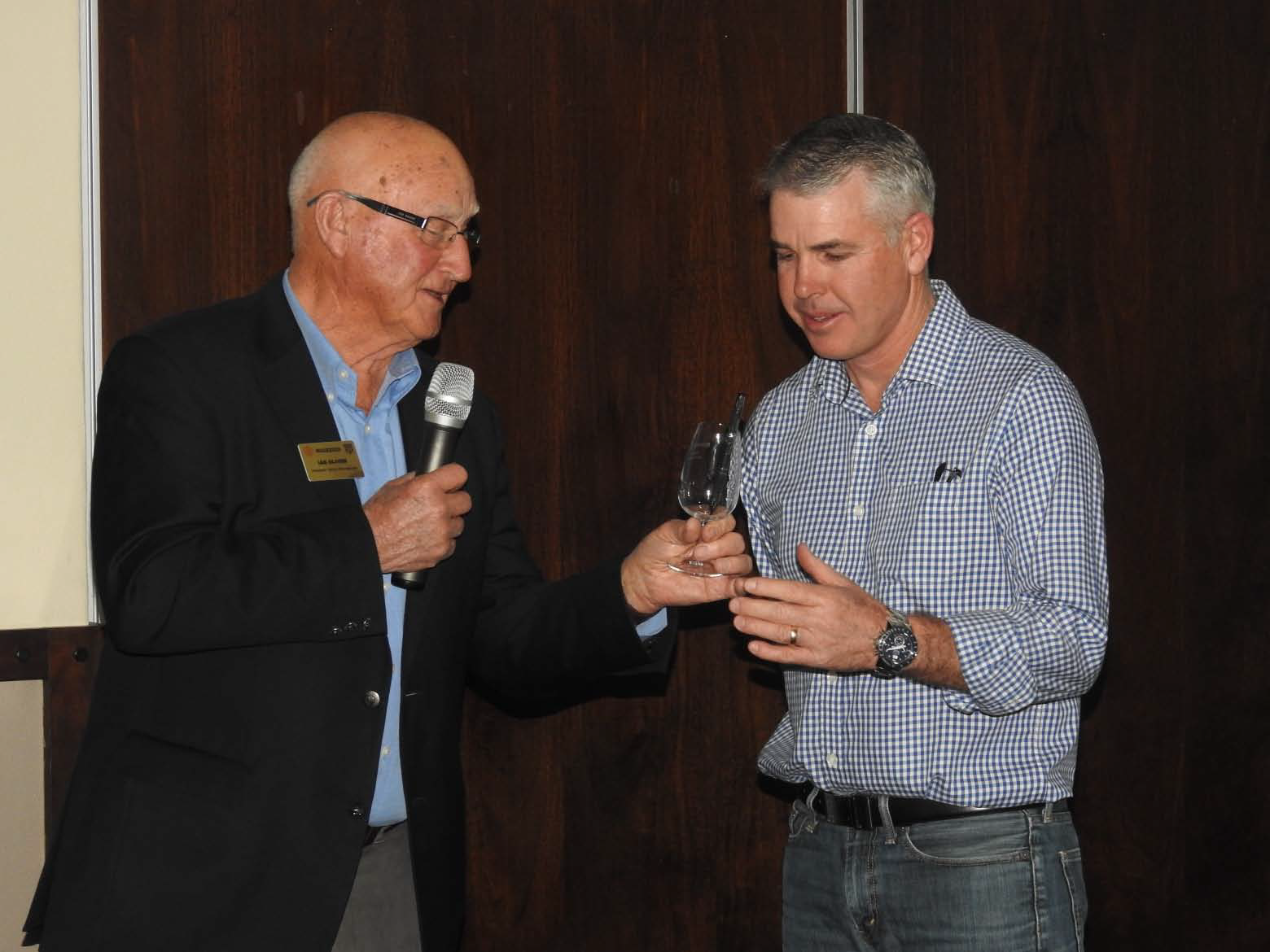
His animals are housed on straw in areas where they can move around. Only the farrowing sows are in farrowing pens to stop them from rolling on the piglets.
When there is a glut of pigs prices go down. This is caused by farmers overstocking when times are good and having to de-stock when times are bad. Currently farmers are losing approximately $70 a head. They are currently paying out 60% on feed, 13% on wages and 7% on health.
Pork is one of the healthiest meats you can eat.
- Take a 2 cm thick pork steak.
- Preheat the pan
- Cook the pork for 6 mins without turning, turn for 2 mins and then turn for another 2 mins.
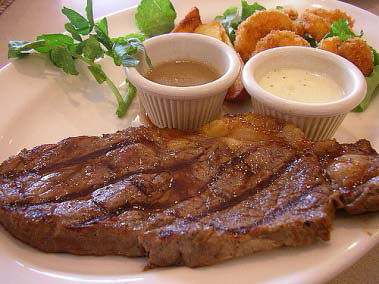
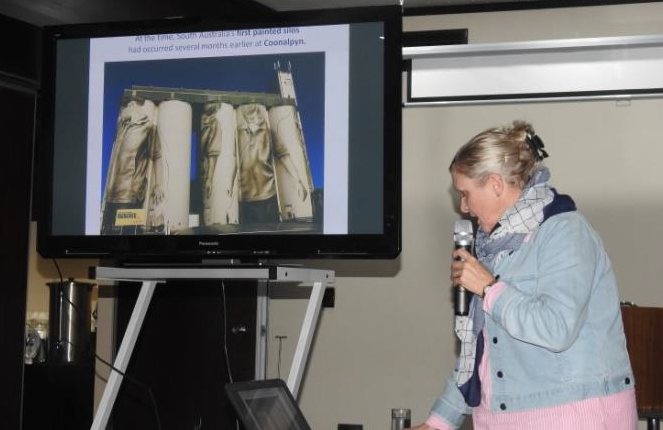
Liz showed photos of a few silos that have been done in Victoria and South Australia (eg. Brim, Patchwollock, Tumby Bay).
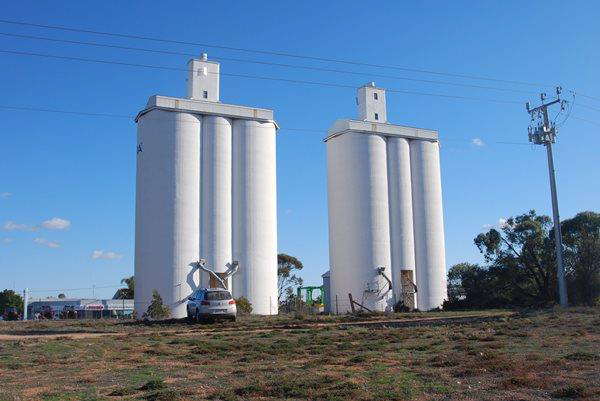
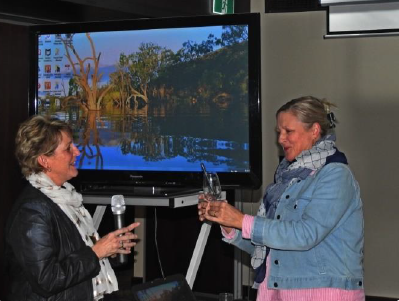
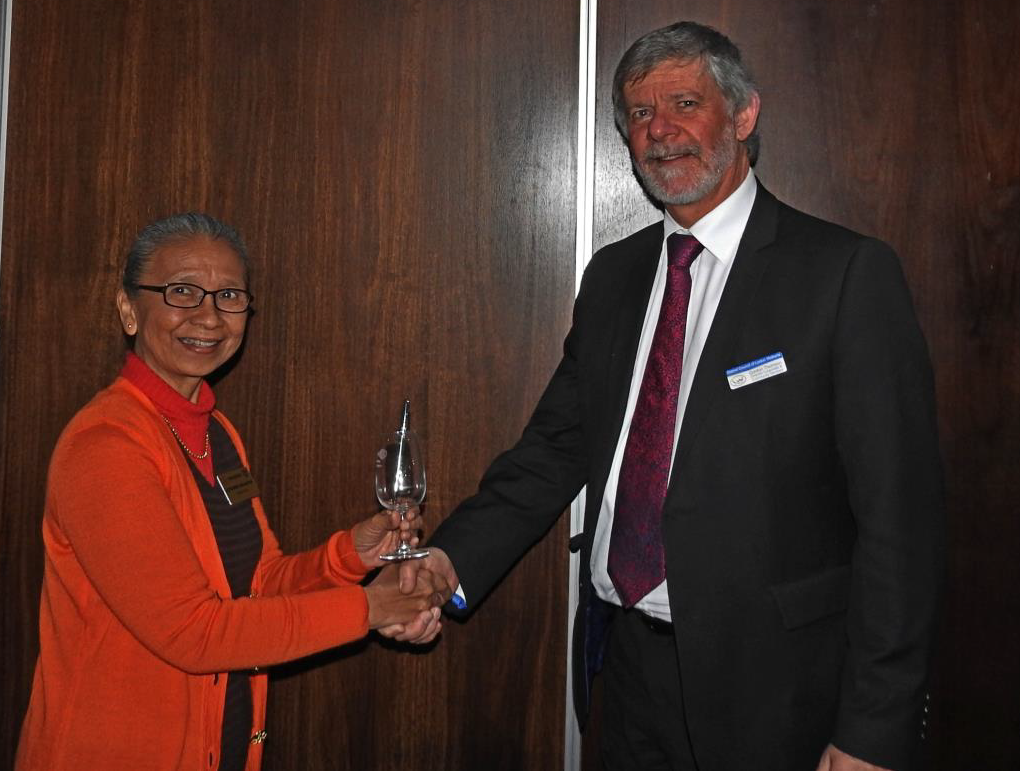
He initially told us a little about himself. He came from the Adelaide Hills and had visited Waikerie during the 1970’s. He moved to NZ for 10 years . Getting tired of his career path he decided to join the local government and worked in the Lachlan Shire in NSW (Condobolin) and Queensland before coming to Waikerie.
Gordon foresees that Waikerie is in for a good time as there are several good projects in the wind. One of the ideas for the new Visitor Information Centre (VIC) was to use the old Bond Store adjacent to the riverfront. However it is currently occupied by the Lions Club and they declined the offer from the Council to build a complex near the Mens' Shed and then move from the old Bond Store.
So it is back to the drawing board and the decision of what to do with the old Bonds Store.
Gordon said if the Club have any issues please let the Council know. Ring or go in and make an appointment. Grant submissions should already be in as the budget timeline is the 1st of June. This year we have Council elections and this makes the budget timeline different.
The Tourism Minister met in Renmark to discuss Destination Riverland and how we can improve our visitor rate. 80% of our visitors are from the Riverland and the remainder are are mostly from wider SA. If we have any events then contact the Riverland Events Calender re uploading onto the site. In 2018 information booklets were made more regional and we now have hard copies of maps and things to do in our area available at the VIC and other outlets. The question to be asked is "Once people are here how can we attract them to stay longer?".
Gordon thanked our Club for its involvement in the Community.
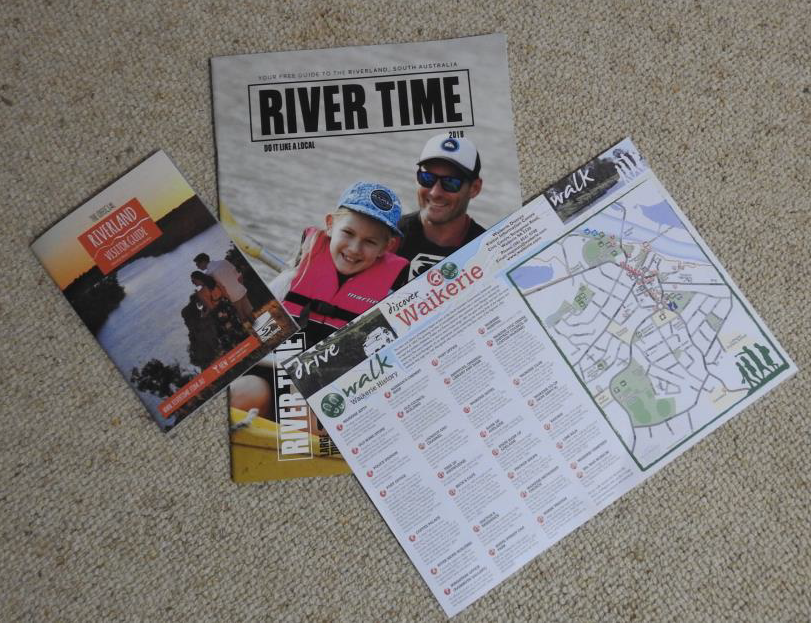
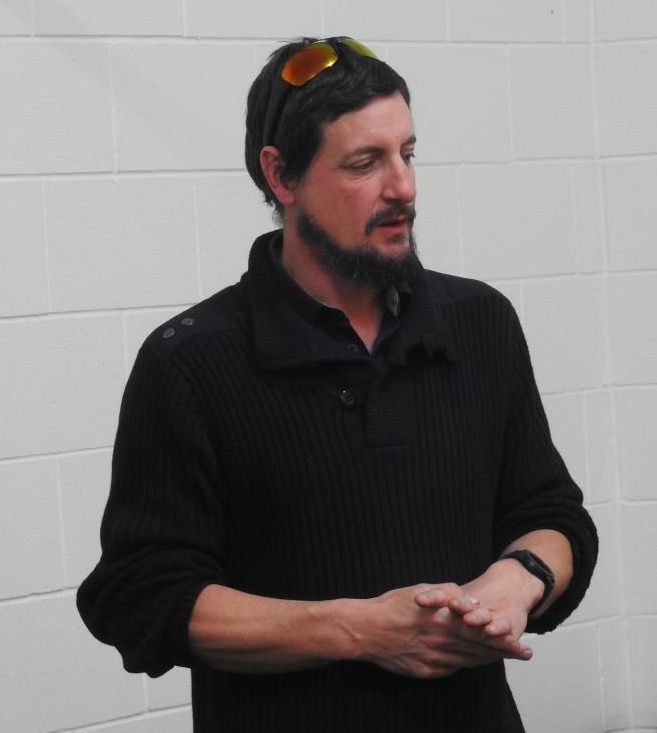 Chris Mibus of the Youth Hub addressed the meeting and thanked Rotary for the donations of the stove, microwave, range hood, dishwasher, fridge and several other electrical goods. He also thanked Roger Davies for organising and bringing the Work for the Dole team for the building work.
Chris Mibus of the Youth Hub addressed the meeting and thanked Rotary for the donations of the stove, microwave, range hood, dishwasher, fridge and several other electrical goods. He also thanked Roger Davies for organising and bringing the Work for the Dole team for the building work.
Chris described how the concept of a Youth Hub went from idea to reality. As a member of the Uniting Church he suggested the empty premises be used for the youth as he believed there was a need for somewhere safe for the youth of Waikerie to "hang out". Chris accidentally met up with Peter Ackland, CEO of the Loxton Waikerie Council, at a meeting and started discussing the idea with him. Peter suggested ideas for the centre and recommended he apply for a grant. During the next few months of speaking to many local organisations, hard work and advertising, Chris managed to formulate a plan and begin its implementation. He received donations of tables, chairs, pool table, etc and started the transformation of a vacant building into something that the youth might appreciate. Eventually the centre was opened and Chris sat and waited. No one turned up for a couple of hours and then eventually one person came in. From this small beginning it has slowly grown. Three years on and now at least twenty five of the local youth frequent the venue every Friday evening. At the last count there are more than seventy two different youth who have signed into the venue. From small things, big things grow!
Chris explained the “Hub” is not a child minding centre for youth but is a safe environment where kids can "hang out", have a meal, and talk without being judged or victimized. In this world kids find it difficult to open up whereas here they have someone who will listen to them, and someone in whom they can trust.
The centre provides many activities to engage the youth. They do craft, have community members teach them various skills (eg. health and beauty, sewing), and many other under-takings. At one stage the Rotary Club invited them to the Opportunity Shop where the youth chose several garments. This demonstrated to them the idea of recycling clothes. They also took the opportunity to use some of the items within their craft creations. The centre is always on the lookout for donations of things the kids can use, whether it be craft supplies, sewing machines, a woodwork teacher to assist the boys, or any other item.
The centre has found that most of its clientele are of upper primary school age and lower secondary. However, as the centre moves forward they are finding that older kids want to stay on. One of their goals is that some of these youth will become mentors for the newcomers.
Chris outlined there is still a lot more to do in bringing the physical environment of the centre up to a "nice" standard as there is still a lot painting to be completed, a new air conditioner is required, and there are many other items in need of repair. This is a slow procedure but in time it will be done. The Rotary Club has offered its support to this enterprise.
At the conclusion of Chris' talk Richard Hall presented him with a donation of $400 - this being the collection from the members who attended on the night.
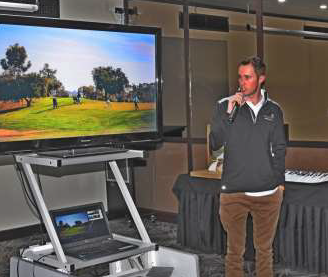 Brad gave an overview of the progress at the Waikerie Golf Club. He talked about the renovations that took place when his Mother (Julie) bought the club and the development of accommodation with the new “Villas” He showed the plans for future development with more villas and a caravan park to cater for grey nomads touring.
Brad gave an overview of the progress at the Waikerie Golf Club. He talked about the renovations that took place when his Mother (Julie) bought the club and the development of accommodation with the new “Villas” He showed the plans for future development with more villas and a caravan park to cater for grey nomads touring.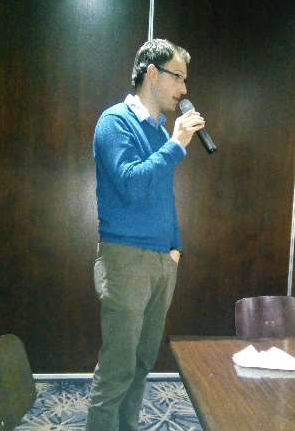 Jacob spoke about his path into medicine. He came from Mount Gambier and after taking a gap year working in a winery he began study at Adelaide Uni in Physics and Space Science. He then took on a post graduate course in medicine at Flinders University. He spoke about the extremely challenging six hour exams and interviews he had to go through to achieve his medical qualifications. He also described the trial program to attract rural doctors that took place in the Riverland and the positive response he has received from the local community. His final results were outstanding - he was the highest ranked student in Australia.
Jacob spoke about his path into medicine. He came from Mount Gambier and after taking a gap year working in a winery he began study at Adelaide Uni in Physics and Space Science. He then took on a post graduate course in medicine at Flinders University. He spoke about the extremely challenging six hour exams and interviews he had to go through to achieve his medical qualifications. He also described the trial program to attract rural doctors that took place in the Riverland and the positive response he has received from the local community. His final results were outstanding - he was the highest ranked student in Australia.Jacob acknowledged the fantastic support he received from Dr Ken and Allan Miller. We are extremely lucky to have such a qualified doctor working in our community.
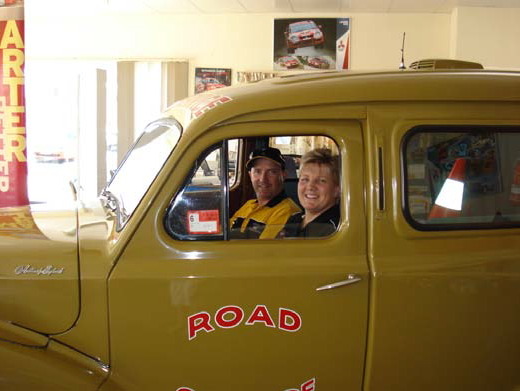
9th May 2018
Stuart is the Proprietor of McKay's Auto & Ag Centre, which is also our local RAA Service Centre and approved RAA mechanical repairer.
Stuart originally hails from Cowra in NSW - both his Father and Grandfather were involved in the mechanical trade.
After marrying Linda, they found their home in Orange was far too cold and ended up in Adelaide working for the RAA for 6 years.
He really wanted a rural setting to bring up his young family and so decided to move to Waikerie, where he has been for just over 20 years.
He purchased the business he now runs and soon after, the RAA approached him. The area his RAA dealership covers is huge - it covers the region from Overland Corner to Swan Reach, to Truro and to Burra. RAA training is very tough, and more so these days with increased HSE regulations. Considerable amounts of time are taken simply in training in these areas.
- Approximately 2000 call outs per year;
- Approximately 200 accidents are attended each year;
- 40 - 50 impounds are made each year.
- A lot of relocations are also made.
Their business has also diversified in looking after other modes of transport such as gophers and push bikes.
After agonising about buying his first tow truck, he now has 4 of them. They are now all dual cabs as that offers customers a far safer journey back to the depot with their vehicle, instead of having to wait for alternative transport such as a taxi.
